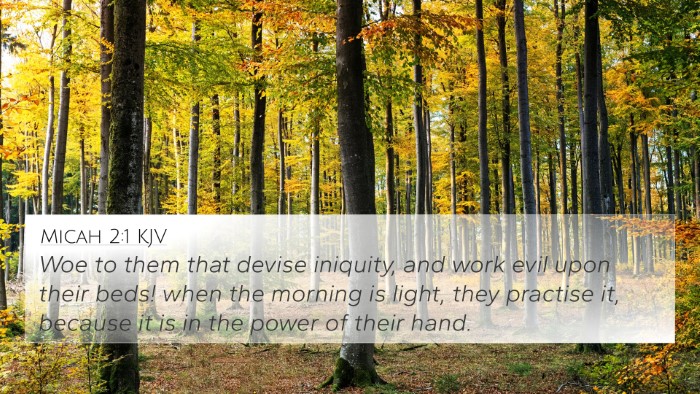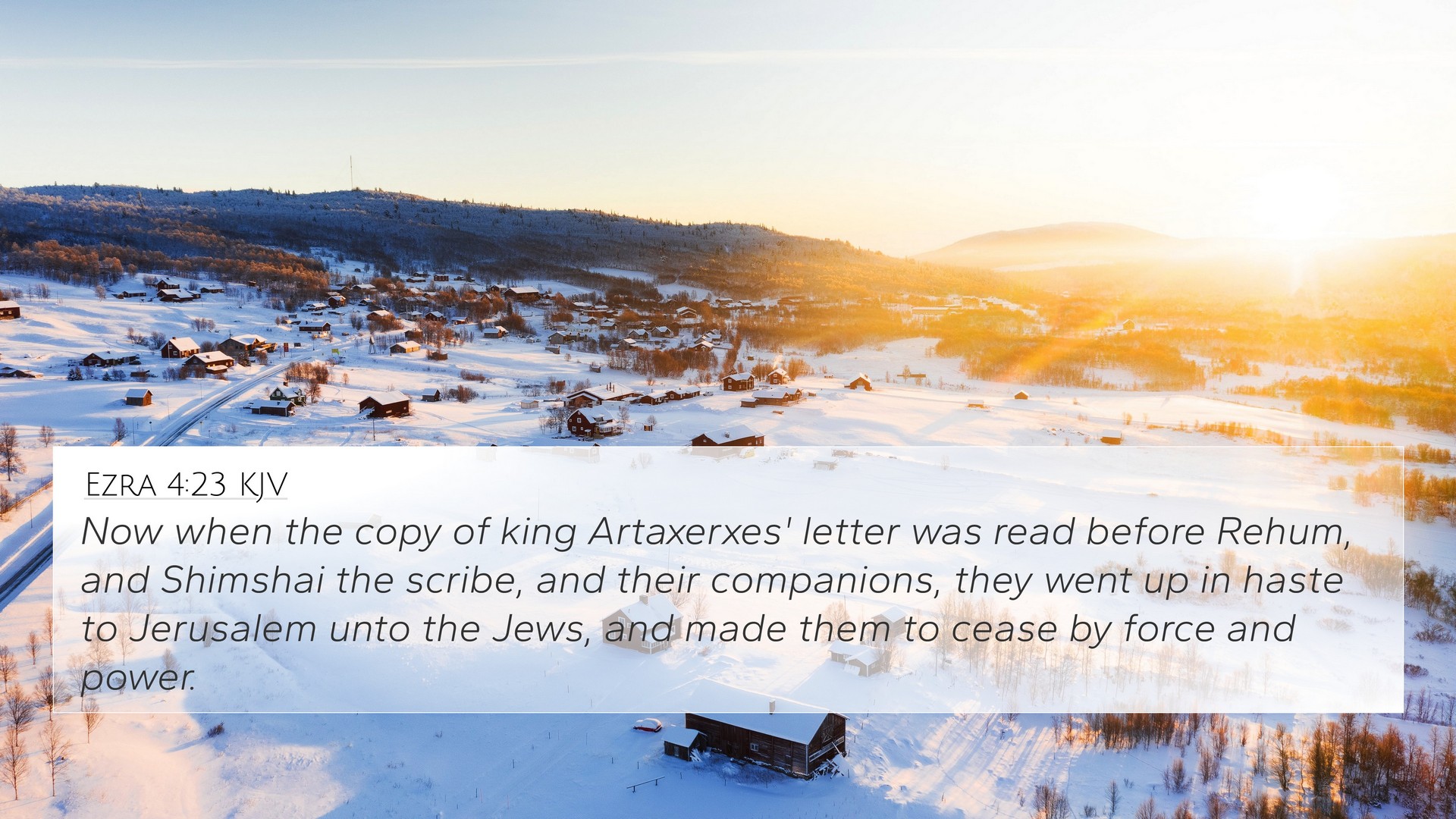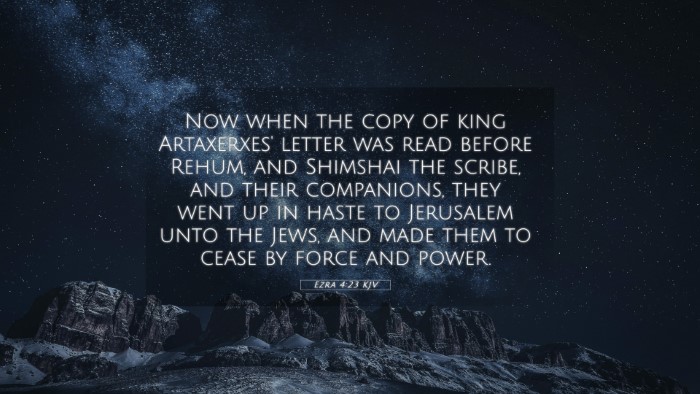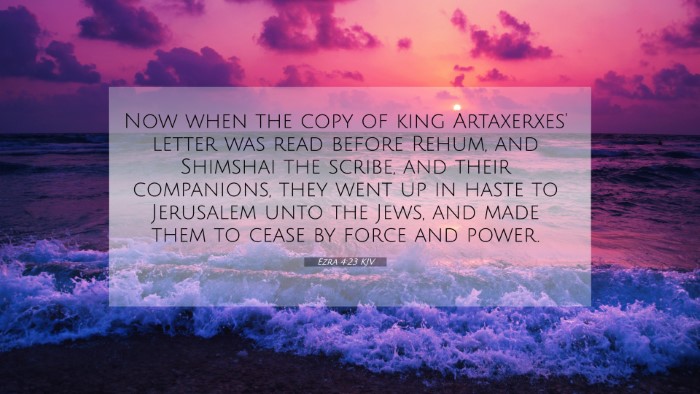Old Testament
Genesis Exodus Leviticus Numbers Deuteronomy Joshua Judges Ruth 1 Samuel 2 Samuel 1 Kings 2 Kings 1 Chronicles 2 Chronicles Ezra Nehemiah Esther Job Psalms Proverbs Ecclesiastes Song of Solomon Isaiah Jeremiah Lamentations Ezekiel Daniel Hosea Joel Amos Obadiah Jonah Micah Nahum Habakkuk Zephaniah Haggai Zechariah MalachiEzra 4:23 Similar Verses
Ezra 4:23 Cross References
Now when the copy of king Artaxerxes' letter was read before Rehum, and Shimshai the scribe, and their companions, they went up in haste to Jerusalem unto the Jews, and made them to cease by force and power.
Uncover the Rich Themes and Topics of This Bible Verse
Listed below are the Bible themes associated with Ezra 4:23. We invite you to explore each theme to gain deeper insights into the Scriptures.
Ezra 4:23 Cross Reference Verses
This section features a detailed cross-reference designed to enrich your understanding of the Scriptures. Below, you will find carefully selected verses that echo the themes and teachings related to Ezra 4:23 KJV. Click on any image to explore detailed analyses of related Bible verses and uncover deeper theological insights.

Ezra 4:8 (KJV) »
Rehum the chancellor and Shimshai the scribe wrote a letter against Jerusalem to Artaxerxes the king in this sort:

Ezra 4:17 (KJV) »
Then sent the king an answer unto Rehum the chancellor, and to Shimshai the scribe, and to the rest of their companions that dwell in Samaria, and unto the rest beyond the river, Peace, and at such a time.

Proverbs 4:16 (KJV) »
For they sleep not, except they have done mischief; and their sleep is taken away, unless they cause some to fall.

Micah 2:1 (KJV) »
Woe to them that devise iniquity, and work evil upon their beds! when the morning is light, they practise it, because it is in the power of their hand.
Ezra 4:23 Verse Analysis and Similar Verses
Understanding Ezra 4:23
Ezra 4:23 states: "Now when the copy of King Artaxerxes' letter was read before Rehum, and Shimshai the scribe, and their companions, they went up in haste to Jerusalem unto the Jews, and made them to cease by force and power."
Meaning and Interpretation
This verse highlights the decisive actions taken by Rehum, Shimshai, and their associates after receiving the King’s letter, which intended to halt the rebuilding efforts in Jerusalem. The forceful intervention illustrates the political dynamics and power struggles during this period of Jewish history.
Insights from Public Domain Commentaries
- Matthew Henry: Henry emphasizes the strong opposition faced by the Jews in their attempt to restore their city and temple. He notes that the letter from Artaxerxes, which was meant as a protective measure for the Jews, ironically became a tool for their oppressors. This reflects the broader theme of God's people facing challenges, even amid divine favor.
- Albert Barnes: Barnes points out the significance of the swift action taken by Rehum and his companions. The urgency with which they responded indicates the seriousness with which they took the King's order. This reveals a contrast between the commitment of the oppressors and the vulnerability of the Jewish community trying to rebuild.
- Adam Clarke: Clarke highlights the historical context and the complexities of the political environment during this time. He notes that every effort to restore Jerusalem was met with fierce resistance. It serves as a reminder of the struggles involved in spiritual revival and physical restoration.
Cross-References Related to Ezra 4:23
- Ezra 4:1-2: The initial adversaries of the Jews who offered help but intended to undermine the restoration.
- Nehemiah 2:10: Nehemiah's concern for Jerusalem aligns with the efforts mentioned in Ezra.
- Isaiah 44:28: God uses a foreign king to facilitate the rebuilding of Jerusalem, displaying the sovereignty of God over earthly powers.
- Daniel 9:25: A prophetic reference to the restoration of Jerusalem, showing its significance in God's plans.
- Acts 4:23-31: The apostles faced similar opposition yet were emboldened through prayer, connecting the struggle in Ezra to the New Testament.
- Hebrews 12:1-2: Underlines perseverance in the face of opposition, paralleling the challenges in Ezra’s narrative.
- Ezra 5:3: Acknowledges the ongoing resistance even after the initial reports to the king.
Connections Between Bible Verses
Exploring the connections between verses in Ezra 4:23 and the referenced texts unveils a rich tapestry of God's overarching narrative throughout Scripture. Themes such as opposition to divine plans, the importance of perseverance, and God's sovereignty are continuously echoed.
In examining this verse alongside Nehemiah 6:1-9, we see continued resistance but also the unwavering commitment to God's mission, illustrating the challenges believers face in pursuing God's calling.
How to Use Bible Cross-References
To enhance your study of the Bible, consider utilizing the following tools and methods:
- Bible Concordance: An essential tool for finding specific references and connecting themes across scriptures.
- Cross-Reference Bible Study: Engage with multiple verses that address similar themes, providing a deeper understanding.
- Bible Reference Resources: Use guides that list relevant scripture connections to enrich your study.
Thematic Connections
Key themes for further exploration include:
- Opposition to God's Work: Seen throughout Scriptures, emphasizing that resistance is part of the believer's journey.
- God's Sovereignty: The interplay of human actions and divine purpose, particularly in historical narratives.
Conclusion
Understanding Ezra 4:23 requires careful contemplation of its historical context and the broader narrative of Scripture. By engaging in cross-referencing and comparative analysis, readers can glean insights applicable to their spiritual journeys. This verse serves as a reminder that challenges will arise, but God's purposes prevail, underscoring the importance of faith and perseverance in the face of opposition.



